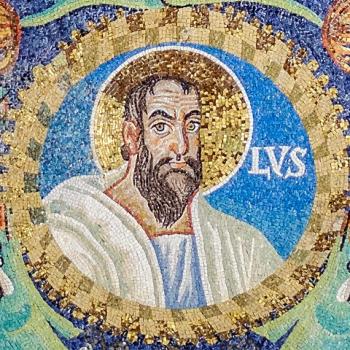
Morality is important for the Christian faith. Christians should seek after and engage the greatest good, which of course, is found in and with God. But to do that, they must not deny other, particular goods, for all those goods participate in and are a part of the greatest good. Denying them, rejecting them and their proper value, denies the good from which they came. This is why Christians should be doing what they can to engage and promote what is good, so long as they do so by not separating that good from the greatest good itself. By doing so, they share in the good which they do, the good which they promote, and through that good, they find themselves journeying closer and closer to the greatest good itself.
We are not saved just because we have some good, pious ideas about God; we are saved by faith. How can we say we are faithful if we do not try to act with fidelity to God, doing what God told us to do? When we stumble, when we fail to do some good as a result of our weakness, ignorance, bad habits, or the like, God gives us the grace to pick ourselves up and try and try again. If we do not try, if we ignore God’s expectations, if we deny them, saying we do not have to do them so long as we believe the right things, we show our true lack of faith, because we show we do not think what God tells us is not that important. This is not to say our salvation comes from works, as if we can just work our way to perfection all by ourselves, because we cannot; we need grace, and without it, we cannot attain perfection. However, if we expect God to do everything for us, that there is nothing for us to do, and that we can do anything we want and be saved, that proves our infidelity to God, and with such infidelity, we have denied grace itself because we do not let grace transform us and make us doers of the word.
Grace requires our cooperation with it for it to be effective. Struggling to do what is good, but slipping, opens us up to it, but if we think doing what is right, such as taking care of the earth, is worthless, we show we are not open to grace and risk suffering the consequences of that rejection. This is why talking about social justice, talking about being good stewards of the earth, talking about the expectations God has for us in relation to the poor and needy, is not countering the church’s mission but rather serves it, because the salvation of souls cannot be had without proper moral reform. The pursuit for the greatest good includes the good God intends for creation, it does not sidestep or ignore those intentions.
Sadly, too many people have been led to believe morality, like theological doctrine, is all about accepting and fulfilling a few propositions, propositions which are taken legalistically, so that what is not said by such propositions are seen as fair game, while what is said in them are understood in the most legalistic, and literalistic fashion possible. This is a problem which is especially prevalent today as it has been taken by many to be the norm of tradition, when in reality, it is a rather modern, as André Louf OSCO explained:
During a certain period, which we may consider as covering the greater part of the nineteenth century and the beginning of the twentieth, moral choice became reduced to the application of certain rules of morality as they had been organized in Moral Theology. Conduct seems to have yielded to legalism: one attempts to conform to a body of rules as one conforms to a law in secular life. [1]
While moral precepts, like theological doctrines, have value when properly understood, they are often taught without giving the means to properly interpret and engage them. They are presented in a simplistic fashion, without any indication of the context in what they are stated, the context which is needed to properly understand them. When morality is presented in this fashion, we find this leads many to become unable to properly engage morality for themselves; they are stuck in and with a rather limited notion of what is and is not good, so that the greater good, the good which is meant to be pointed to by those propositions, is either lost or ignored by them. Precepts which are meant to serve as examples, helping us consider the greater good, are turned into traps which keep us away from it. The life which we should have as Christians, the life in the Spirit, is denied us:
In a climate of legalism and moralism, the canons no longer distinguish life from death; their function ceases to be one of revelation and liberation, of healing and care. They operate as a ruthless code of moral legislation which evaluates individual transgressions and metes out exemplary punishments. [2]
Yes, people want things to be simple, and that is why many treat morality, or doctrinal theology, in this fashion:
It would be infinitely simpler if the experience of faith were reduced to an assent to a block of clear and simple absolute truths about God and man, that is, a body of knowledge. In that case, an intelligently formulated catechism explained by a good catechist using a proven teaching method would be amply sufficient. The believer would be asked only to learn and memorize a certain number of notions, to be able to draw his own logical consequent conclusions in case new problems present themselves, which is within the realm of possibility in a constantly changing society. Then we would need a good theologian or an experienced catechist, not a pedagogue or someone to accompany our life! [3]
Having morality understood in this way is, in one sense, easier, but it denies morality the life-giving Spirit, the grace and transcendence which we need. As long as we believe the faith can be comprehended by a set number of propositions, including those dealing with morality, we have not properly understood the faith or what God wants from us. God wants us to live, to grow, to become better, to learn more and more, to have our minds and spirits grow as we live and do what is right and just throughout our lives. God wants us to reach out for the transcendent good, the greatest good, the good which is found with God alone, but we will not do that so long as we are stuck with a legalistic mentality. We need grace, the grace which such legalism denies us. “But the essence of the Christian life lies in a spiritual journey towards God made possible only by the grace-inspired theological virtues of faith, hope and charity.”[4] Faith, hope, and charity should be the center of our lives, not theological or moral propositions. Propositions are pointers to help us know the direction we need to go for our growth, that is, to make sure we do not wander far astray, but if we take the pointer as the thing in and of itself, we end up stopping our progress and so end up doing what we sought not to do, which is go astray. And with the greatest of the three being charity, so we must understand the Christian life is to be one of charity, caring for the dignity of all, especially the vulnerable and the oppressed:
People of the Kingdom of God throb with sympathy for every human person. If they see their brothers afflicted with anxiety, they yearn after their welfare. They never feel a need to compare themselves with anyone else. They waste no energy in refuting hostile opinions. They do not convert; they lead others to religious experience. They do not moralize; they reveal the true dignity of those who are to inhabit the Kingdom. Their inspiration comes from above, from the inner working of their being in the Kingdom of God. They can only radiate peace and confidence. They are not crusaders, because their strength is chaste and limpid. Christians are not in heaven or in the Kingdom; the Kingdom and heaven are in Christians.[5]
This, then, is what we should be after: a life of charity, one which is inspired by the hope given to us by our faith, a faith which transcends the propositions which we make to represent it. We are to be drawn to the great mystery which is God, the God who is love, the God who is the source and foundation of every good, and as such, the greatest good; in pursuing the greatest good, seeking after it in the way of love, we will have the reason to hope that even if we do not know or comprehend the greatest good with our thoughts and words, we will find ourselves growing better, and so come closer and closer to our goal, which should be union with God. That growth should make us more like God, which means, we will, like God, seek to help those around us. When we deny this growth, when we deny the love and care we should have, we are no longer set on the path toward salvation, but rather, sadly, find ourselves on another one, the wide path which Jesus told us to avoid for our own good.
[1] André Louf OSCO, Grace Can Do More. trans. Susan van Winkle (Kalamazoo, MI: Cistercian Publications, 2002), 9.
[2] Christos Yannaras, The Freedom of Morality. Trans. Elizabeth Briere (Crestwood, NY: St. Vladimir’s Seminary Press, 1984), 189
[3] André Louf OSCO, Grace Can Do More, 34-5.
[4] Stephen J. Pope, “Natural law and Christian ethics” in The Cambridge Companion to Christian Ethics. Ed. Robin Gill (Cambridge: Cambridge University Press, 2001), 81.
[5] Archbishop Joseph Raya, The Abundance of Love: The Incarnation and Byzantine Tradition (Combermere, ON: Madonna House Publications, 1989; 3rd ed.: 2016), 140.
Stay in touch! Like A Little Bit of Nothing on Facebook.
If you liked what you read, please consider sharing it with your friends and family!
N.B.: While I read comments to moderate them, I rarely respond to them. If I don’t respond to your comment directly, don’t assume I am unthankful for it. I appreciate it. But I want readers to feel free to ask questions, and hopefully, dialogue with each other. I have shared what I wanted to say, though some responses will get a brief reply by me, or, if I find it interesting and something I can engage fully, as the foundation for another post. I have had many posts inspired or improved upon thanks to my readers.













